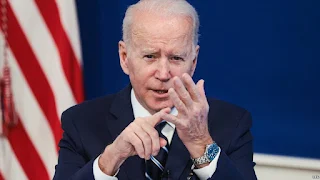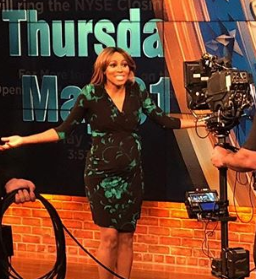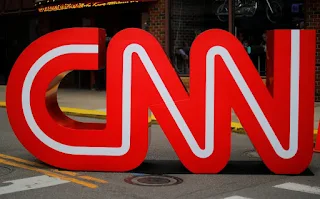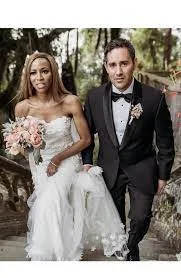Cable News Network CNN International Anchor, Zain Asher is an inspiration to her peers and the younger generation, but interestingly, not many people knew that she is Igbo of Nigerian descent.
Fluent in English, French, Spanish and Igbo, Zain is the younger sister of Academy Ward winning actor, Chiwetel Ejiofor.
She was in Nigeria within the week and was hosted on the Arise TV Morning Show where she spoke on the International Women’s Day vis a vis women in the media and their roles in shaping narratives.
Zain said she would have wished to see a world where women’s achievements are not genderized but seen as regular exploits of human beings.
She said; “It is my wish that there was no need for an IWD. Yes we want to celebrate women’s achievements but we also want everything that women do to be ordinary and not necessarily remarkable.
When I think of IWD, I think of how important representation is, how important it is to see, especially as a black woman, women who look like me in my roles and I hope that I can be that for other women as well.
It is so powerful and so important for a young woman growing up to see women who look like you in high power positions. That does a lot of wonders for young women”.
On the theme of the International Women’s Day, ‘Breaking the Bias’, Zain said it is important for women who are in positions of power to use their influences to uplift other women rather than engaging in unnecessary rivalry.
“Sometimes I get asked, what sort of bias hinders you the most? Is it being black or is it being a woman?
Because in the US you have to contend with both and I think that when you are in a position of power, for me, the most important thing is that we all, as women, use our superior influence to lift up other people.
Yes, I have a platform, the CNN but we all have platforms. It does not matter where you are. We all need to use our spheres of influence to lift other women up and stop competing with one another.
We should use our positions of power to pass the baton to the younger generation”, she said.
From Receptionist to CNN Anchor
Zain, short for Zaina, was once a receptionist at a production company. Although, she was saddled with the responsibility of welcoming visitors and serving them water, the Igbo woman had higher dreams.
She was serving visitors who were coming for the job she wanted. Zain actually wanted to rise to the highest level in the production company but fate had a mode befitting plan for the young lady.
“My first job out of university was actually as a receptionist in a production company for about three and a half years.
As a receptionist, I really wanted to move up within the production company. That was my goal. Because I was the receptionist, it was my job to serve water to anyone who was coming to apply for the job I wanted. I had to serve water to them.
The message for the younger ones is that success is never in a straight line. You see me on CNN, but it was very difficult to get there. The hustle was real.
Trust your struggles. You trust that despite all the pitfalls, that if you continue to push, and work hard – I really, really worked hard to get to where I am – that one day, the struggle will pay off.
“Whatever it is that you want to do, if there is a way now to start on the job that you have to do the job that you want, then start doing it.
“There is a very close friend of mine who started in a very junior position at CNN. He graduated from the University where I went and he was a junior sort of Personal Assistant, making very little money.
When the Haitian earthquake happened, he decided a year later to go to Haiti, pack his bags and film. He wanted to see how the people there were coping.
He came back, even though he was not an anchor or reporter, showed the clips to them (management) and they were excellent and that made him a correspondent. This was somebody who went from a very junior position in CNN to becoming a correspondent because he did the job before he had the job.
That is my advice. If there is a way – there is not always a way – for you to start now to do the job that you want, you take out the risk element from the people who would eventually hire you.
One good memory she cannot forget was growing up and seeing a Nigerian woman, Femi Oke on CNN. Zain would go on to contact Oke through her email address, letting her know how she (Zain) adored her and how she would love to be mentored by her.
“You remember Femi Oke. When I was growing up as a young girl in London, I would see Femi Oke on the screen and as part of my mother’s desperation for images of black success, every time she came on, my mother would shout to us, Nigerian on CNN and we would run downstairs an sit in front of the TV. So, as I grew older, Femi Oke moved around different media organizations in the UK.
Eventually I came to America and one day, I turned on my TV and I saw Femi Oke on CNN. I was so moved by how well this Nigerian woman had done. I sent her an email, just telling her what she meant to me, growing up and seeing her on TV some years ago.
Surprisingly, she replied, gave me her phone number and said I should call her at any time. I called her and we kept in touch over the years and eventually, maybe 5 to 10 years later when I had an interview at CNN, I reached out to her and she really indeed worked me through how the interview process at CNN was like, how to answer the questions and what a typical day at CNN is like, what they expect of me, taking me on what to say and what not to say. Obviously, it worked out perfectly and I owe a lot to Femi Oke.
So, seeing a Nigeria woman in that role from the age of maybe 17 onwards, not only was it a beautiful representation of my culture but it changed my entire life.
And that is, I hope something I can continue to do for other people. That is why when people reached out to me, I would always write them back because Femi Oke did that for me”, she fondly recalled.
Strength of Nigerian woman. On her new book, ‘Where the Children take us’, Zain speaks of how her mother struggled to give them a good life after the death of their father in 1988.
She speaks of the uncommon strength of the Nigerian woman who would achieve whatever she sets her hearts on.
Zain speaks more on the book. “What motivated me was a TED Talk that I did on how I grew up, how my mother raised me. My mother is a strong Nigerian woman. She was a single mother.
“On September 3 1989, she got a call which I would say was the worst day in our lives, and the voice on the other end of the line basically said “your husband and your son have been involved in a car crash. One of them is dead and we don’t know which one.
That happened to my family and it turned out to have been my father who had passed away but initially they thought everybody in the car had been killed. It was only when they got to the morgue and began unloading the bodies that they realized my brother was still breathing and that brother went incredibly to been nominated as best actor at the Oscars.
What inspired her book “The book is really about how in the wake of that tragedy, my mother raised us and thanks to her, we ended up surpassing all expectations. My sister is a medical doctor and my other brother is a very successful entrepreneur and it was only because of the kind of mother that we have.
I really wanted to educate the rest of the audiences about the special growth that Nigerians have. They are warriors, they are fighters and my mother is a queen.
“I am very aware as somebody who grew up in England and has lived in the US for 17 years now, that if this book was going to be the first story that a lot of Americans read about an African family, I really wanted it to be informative and educational.
Yes, the book is about my family but I really wanted it to be a celebration of the Nigerian family and one thing I said in the book is that people may not know much about Nigerians living in the West.
Our beaches are not featured on travel magazines. There are no safaris on our savannahs. Tourists do not throng this country to pose for pictures on monuments but one area I think Nigerians really do shine is that we have sent armies of ambitious and talented children to every corner of the world.
In 2013, it was stated that even though Nigerians made up less than one percent of the US population, in that particular year, they made up 25 percent of the students at Harvard Business School. You look at the fact that they are probably the most educated immigrant group in the US.
I think about four percent had doctoral degrees and another significant number had masters. We are an overlooked minority in the US, sometimes looked down upon. I think we have a lot to offer and I really wanted to educate the world about my people.
“To be honest, there is a universal level of inspiration in what my mother did. She would find stories and articles about black success in The Guardian, The Times, The Independent etc.
She would carve out the news and paste it on our walls. She wanted to change our subconscious to believe in ourselves. So, anytime we came from school, the first thing we saw were images of blacks success on our walls, in the kitchen, in the bedroom.
That changed the image we had of ourselves and she told us that we could have what those people had.
When my brother went into acting, my mother would each evening read Shakespeare in her shop.
She was a chemist. She would read Othello, 12th Night and others just so she could push my brother better. Initially she was like why don’t you become a doctor? But the teachers told her it would be crazy to not let him be an actor because he is very talented.
She agreed and so she began studying Shakespeare on her own. She is a remarkable woman deposits that her education was interrupted during the Biafran war”.
Power of narratives. The CNN International Anchor also talked about media representations and shaping narratives.
On power of narratives, she said; “One of the things that I try to do on my show is to ensure that people, where we they are watching -in Sweden, in Italy- can understand why what happens in Africa is relevant to them.
We live in a connected world, a global world and traditionally it is always the other way round. Africans have always been told about what happens in other places, that what happens in Europe is what Africans should focus on.
We are so connected that really what happens in Africa matters to the rest of the world as well. It is abundantly clear to me that the western way of life would not be possible with Africa.
If you drink tea, coffee or have a cellphone, the tantalite in your cellphone comes from the Democratic Republic of Congo. If you are engaged and you have a diamond ring, it’s the same thing.
It is a continent that is so overlooked and so undervalued. It is important to talk about those narratives. My goal is to really democratize news narratives so that it is not heavily focused on any particular region, Europe or United States but really that everybody has an equal voice, everybody has an equal seat at the global table”.
Igbo heritage. On her heritage, Zain spoke about how her mother brought her to Enugu for two years to prepare her for global exploits.
As she said, her mother brought her to Nigeria in order to toughen her for the battles ahead, because if one could live and survive in Nigeria, then one could capture the world.
She says; “I have an amazing husband, one who is God-sent. I feel as though I have found someone who makes the sun in my spirit shine brighter. Being with this particular person makes the world a better place. That is the way I feel.
*I lived in Enugu for about two years, growing up, from age 10 to 12. When I was growing up, that is when I went to school in Nigeria – and that was because my mother shipped me back because she felt if you could live in Nigeria and survive for two years, you could handle anything that the west would throw at you. She did that to toughen me.
“My middle name is Zaina, my parents grew up in the North, you know, Zainab. My last name is Ejiofor and I added Asher.
One of the things that I was dealing with when I was growing up, especially as a receptionist at the production company was that I was going through a really hard time career-wise. I had difficulties and I would pray and pray over time.
I found the name in the Bible and I looked up the name. Asher means somebody who understands that no matter what happens in their lives, they continue to hang on to their faith and somebody who wants to bring joy to the world.
I just added it as a kind of religious mantra, to keep me in the faith to understand that whatever difficulty the world throws my way, that if I just persevered and have faith in God, I would continue”.
On media representation, Zain also advocated deliberated efforts to balance racial participation.
She said; “In terms of expertise, I found out that Africans were called upon to be experts on issues relating to Africa but people who are from the West could be called upon to be experts on anything including Africa, the Middle East and Europe. So, some of the things I try to do in my show is balance it.
That is important for representation. If you are from the West, let’s also have an African on the panel to discuss the subject.
“With women and their numbers in the media, I think that having low number of representation is not good”
Send your stories and gist to us at genesisnollywood.blogspot.com
Email: genesisnollywood@gmail.com.
 +2348035655009
 @theophilusafe Instagram@genesisnollywood
 www.Facebook.com/genesisnollywood
Email: genesisnollywood@gmail.com.
 +2348035655009
 @theophilusafe Instagram@genesisnollywood
 www.Facebook.com/genesisnollywood




















































Comments